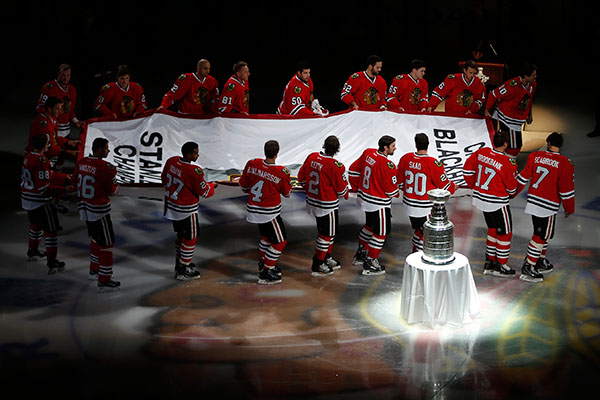
Photo: Scott Strazzante / chicago tribune
On October 1, the Blackhawks kicked off their Stanley Cup banner-raising celebration with a montage of last year’s playoffs, and I watched it alone, at home, thinking about that summer's playoff run and remembering only my Aunt JoCele—my brother’s godmother, my sister's namesake, my mom’s sister, my favorite person.
Any onlooker would have seen a fan watching a tribute and falling apart, like some fans do. But the nostalgia went far beyond the games. It went to the individual moments in my last summer at home, when a loved one died too young and the Blackhawks became the only thing to look forward to.
With grief, there's confusion, loneliness, the doubts—How do I feel? How should I feel?—and always that pain. It doesn’t hurt in one place, or here, or there, or all over. It just hurts, entirely and completely and all the time.
But when the Hawks game started, I, and everyone else in my family, got a reprieve.
The playoffs began on April 30 while I was in Champaign finishing my final semester at the University of Illinois. The Blackhawks beat the Minnesota Wild in a quick, relatively easy series, and it wrapped up two days before my graduation weekend. Graduation was on Friday—mom was there with a hug, dad with a handshake. We took the pictures, had the drinks, ate the big dinner, and then said our goodbyes until the next day. But at the meeting spot on Saturday, my mom wasn’t there.
After lunch, over burgers at the campus bar with my brother, my dad finally said what he'd been waiting all day to say: "You're coming home today. Your Aunt Jo is dying and you need to come home.”
I looked at him, then at my brother, then at the ground. I didn’t say anything. I abandoned my plans to stay another week. I walked back to my apartment, grabbed my toothbrush, told my roommates in a cracking voice that I was leaving, and rode home in my graduation gown.
Aunt Jo died on May 17. Colon cancer. Now, I’m thankful I had a few days to say goodbye, but it was hard to be thankful at the time. It all just seemed so unjust, so undeserved.
From the 17th to the funeral on the 20th, the extended family went through the full procedure. Breakfast, TV, brunch, sit together, lunch, sit together, dinner, breakfast, coffee, the visitation, drinks, sit together, the funeral. You stay together, all the time, busy, without idle time for your mind to dwell on the tragedy. But how can you think about anything else?
Then it’s over. The funeral concludes and life begins again, only this time with a gaping void. You can’t fill it. The people you love keep crying, and there's nothing you can do except focus on something else.
So we went back to what we were focused on before May 17. We watched the Blackhawks.
We picked up with the Hawks down in their series against Detroit, 2-1 after three games I neither watched nor cared about. Detroit won Game 4 as well, and the series and the season seemed just about over. Then the Hawks won Game 5. And in Game 6, they scored three goals in the third period, and won again.
Then there was Game 7, a highlight of this championship montage. It ended in a Blackhawks win on a Brent Seabrook overtime goal that sent my living room (not to mention the rest of Chicago) into a complete frenzy. As the puck hit the back of the net, I jumped off my couch and over my mom, who was lying on the floor. One brother jumped out of his chair and onto my back, while another brother ran out of the room, high-stepping and screaming. My dad fist-pumped in his chair. We hugged. We high-fived. We watched the highlights with smiles for the next hour.
The confusion of the daytime—when a person who lost his aunt needs to comfort a person who lost her sister, who needs to comfort the people who lost their mom—went away for a while. The joy was genuine.
The Blackhawks kept playing, winning, and supplying brief, blissful moments. They closed out the Western Conference Championship against the Los Angeles Kings with a double-overtime game-winning goal. Against the Boston Bruins in the Stanley Cup, they won Game 1 in triple-overtime. They won Game 4 in another overtime thriller, and then won Game 5 on two beautiful Patrick Kane goals. And in Game 6, they took the lead with two goals in the game’s final 90 seconds to dramatically and poetically win the Stanley Cup, and cap off the most amazing postseason I’d ever experienced.
Every game, we all watched together. And every win was celebrated with jubilation. And despite the postseason finishing on the perfect note, we were still sad it was over, and we all knew why.
The Stanley Cup banner celebration brought all of those memories back, all at once, and the wall of emotion destroyed me. I had to walk away. The next day, I watched the montage video to see if I would have the same reaction. But I did not. The tanks were empty. Everything I had stored since June, everything no one said because everyone knew—I’m glad I got to share this with you guys; glad we were all together for this—it had all flowed out.
When the Hawks faced elimination so soon after the funeral, I told myself, “It’s just a game,” because at the time, it was. But I soon realized I was wrong. The games were time we spent together, happy—or, at least, distracted from being so sad. If those were just games, then all the nights with Aunt Jo, when our family was eating and laughing, all of us—that was just dinner.


